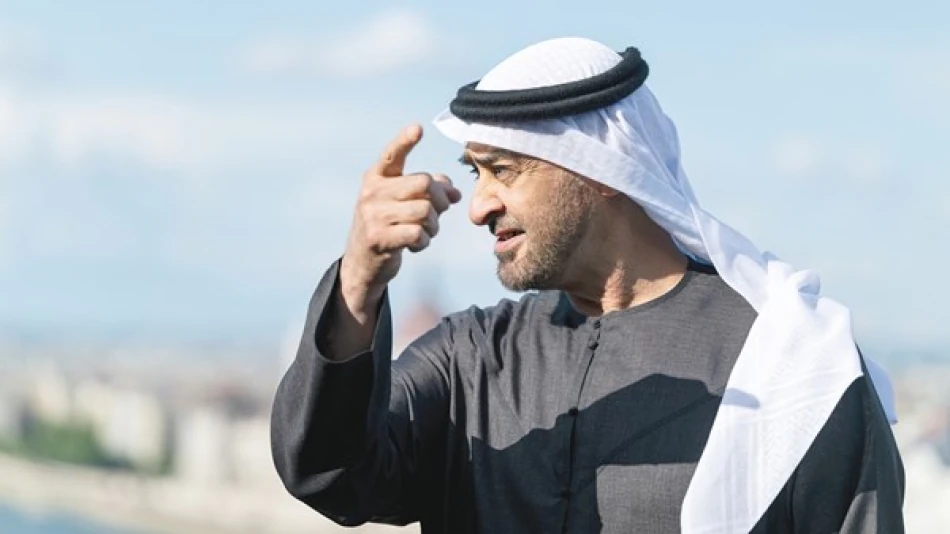
Hungarian FM Praises UAE Leader's Visit, Boosts Bilateral Ties
Hungary Eyes UAE's AI Leadership as Economic Partnership Reaches Historic Heights
Hungary is positioning itself as a strategic European gateway for UAE investments while seeking to leverage the Emirates' artificial intelligence expertise to transform its economy from manufacturing-based to research and development-focused. Hungarian Foreign Minister Péter Szijjártó described Sheikh Mohamed bin Zayed Al Nahyan's recent visit to Budapest as "historic," marking a new chapter in bilateral relations that could reshape Hungary's technological landscape and economic trajectory within the European Union.
Strategic AI Partnership Takes Center Stage
The UAE-Hungary relationship has evolved beyond traditional trade partnerships into a comprehensive technology transfer arrangement. Szijjártó emphasized that Hungary recognizes the global economy is undergoing a massive technological revolution driven by artificial intelligence and digital applications.
"Those who are fastest and most effective in harnessing AI and digital transformation will be the successful players in global politics and economics in the future," Szijjártó stated, positioning the UAE as a world leader in these strategic sectors.
Learning from Emirates' Economic Evolution
Hungary's admiration for the UAE's economic transformation spans decades of strategic pivots. Szijjártó noted how the Emirates successfully navigated from pearl diving to oil dependency, and now to a diversified, technology-driven economy. This historical perspective offers Hungary a roadmap for its own economic transition within the European framework.
The partnership addresses Hungary's immediate need for advanced technological capabilities and rapid adoption of AI solutions. With the UAE leading global AI initiatives through investments in companies like G42 and ambitious national AI strategies, Hungary sees an opportunity to accelerate its development timeline significantly.
Investment Climate and European Advantages
Hungary is leveraging its position as an EU member state with competitive advantages to attract Emirati capital. The country offers the lowest corporate tax rate in the European Union, featuring a single-digit corporate income tax structure that rivals traditional low-tax jurisdictions.
One-Stop Investment Gateway
The Hungarian government has implemented a "one-window" system providing streamlined services for investors, addressing a common complaint about European bureaucracy. This approach mirrors successful investment facilitation models seen in Singapore and the UAE itself.
Szijjártó highlighted Hungary's strategic location within Europe, combined with its economic neutrality policy and proactive approach to attracting investments. The country is actively courting major global companies while investing heavily in creating a world-class business environment.
Tangible Economic Results Emerge
The partnership is already generating measurable outcomes beyond diplomatic rhetoric. Since January, Hungary has exported 15 tons of pharmaceutical products and approximately 1,100 tons of food products to the UAE, indicating diversification beyond traditional European export categories.
Emirati investors are showing increased interest in Hungarian healthcare, real estate, energy, and tourism sectors. These investments align with the UAE's strategy of diversifying its international portfolio while supporting Hungary's transition to higher-value economic activities.
Sectoral Cooperation Agreements
The recent presidential visit resulted in multiple agreements covering data centers, AI projects, green and renewable energy, food and agriculture, family and youth affairs, government development expertise exchange, and energy storage systems. This comprehensive approach suggests both countries view the partnership as long-term and multifaceted.
Regional Implications and GCC Ambitions
Hungary's partnership with the UAE serves as a potential model for broader European-Gulf cooperation. Szijjártó expressed his country's interest in reaching a free trade agreement with the Gulf Cooperation Council, describing it as "possible" and a key to future growth.
This ambition reflects Hungary's recognition that European economic growth increasingly depends on partnerships with dynamic emerging markets. While traditional European powers focus on established relationships, Hungary is positioning itself as a bridge between European markets and Gulf capital.
Geopolitical Stability Factor
Beyond economic considerations, Hungary values the UAE's role as a stabilizing force in Middle Eastern politics. Szijjártó praised the Emirates' "smart and balanced" foreign policy, particularly highlighting the diplomatic efforts of Sheikh Abdullah bin Zayed Al Nahyan in de-escalating regional tensions.
"We know that instability in the Middle East could pose a serious threat to global security," Szijjártó emphasized, positioning the UAE partnership as both economically beneficial and strategically prudent for European security interests.
Future Growth Trajectory
The Hungary-UAE partnership represents a new model for European-Gulf relations, moving beyond energy transactions toward comprehensive technology and knowledge transfer. Hungary's willingness to learn from the UAE's AI leadership while offering European market access creates a mutually beneficial framework that could influence similar partnerships across the region.
For investors, this partnership signals Hungary's serious commitment to technological advancement and its potential as a European hub for Gulf investments. The combination of EU market access, competitive taxation, and streamlined bureaucracy positions Hungary as an attractive alternative to traditional European investment destinations.
The success of this partnership will likely influence other Central European countries to pursue similar arrangements, potentially reshaping the economic relationship between Europe and the Gulf states in the coming decade.
Most Viewed News

 Layla Al Mansoori
Layla Al Mansoori






